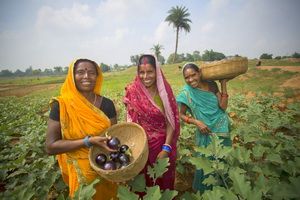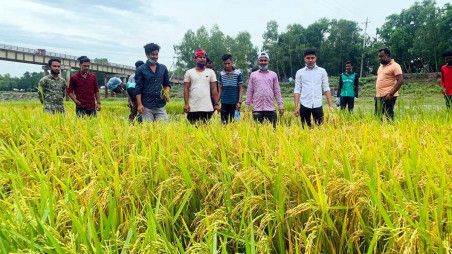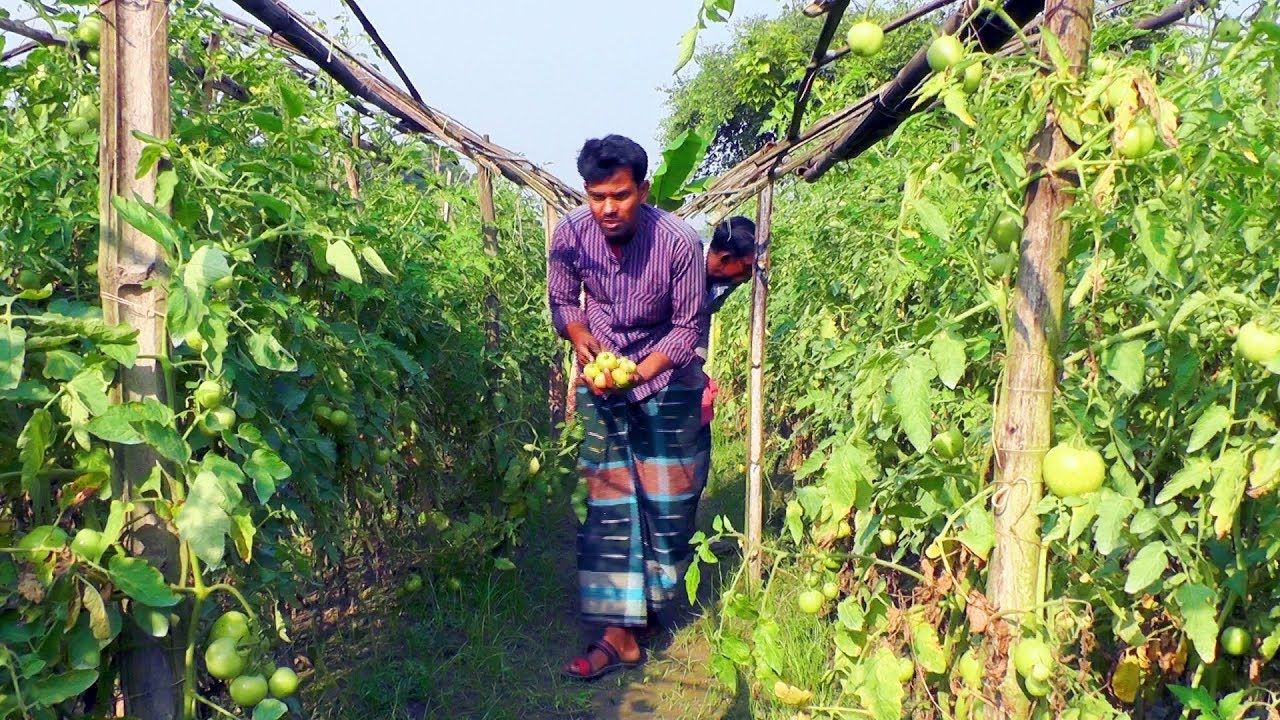
Agriculture and farmer problems in Bangladesh
(BASF.COM)
Agriculture is one of the driving forces of Bangladesh's economy. Agriculture is deeply involved in our overall development as well as livelihood. So the development of agriculture means the overall development of the country. Agriculture is the largest source of employment in Bangladesh. According to the 2016 Economic Survey of Bangladesh, it supplies 40.7 percent of the total labor force and the agricultural sector contributes 13.6 percent to the gross domestic product (GDP). Bangladesh ranks tenth in the world in food grain production. Land and the farming community are the key to Bangladesh's potential and survival in the face of poverty, overcrowding, urban uncertainty and climate change.
As Bangladesh is an agricultural country, its economy is especially associated with agriculture. Agriculture is the only source of livelihood for most people. Bangladesh's geographical location is perfect for the agricultural sector; Because the soil here is more fertile than any other country in the world, which is very important for crop production.

Bangladesh is an agricultural country. Eighty-five percent of the people in this country live in villages. In Bangladesh, 59.64% of the population is rural and 10.71% is urban. The contribution of agriculture sector to the GDP is 19.1% and employment of 47.1% people is being created through agriculture sector. The activities of the Ministry of Agriculture and related departments include the expansion of orchards including cultivation of paddy, jute, cotton, sugarcane, flowers and silk, fish farming, vegetables, livestock development, increase in soil fertility, seed development and distribution.
The farmers of this country usually cultivate in the traditional way. Most farmers are still dependent on plows, ladders and cows for crop production and processing. However, many farmers are now able to increase their yields through various modern agricultural technologies. Although paddy and jute are the main crops of Bangladesh, wheat, tea, sugarcane, potato and various types of vegetables are produced in significant quantities in this country.
For this, there is no alternative to this sector to strengthen the economy of Bangladesh. But it can be said without hesitation that the condition of agriculture and farmers in Bangladesh is critical now. This sector of immense potential has reached the brink of neglect. Those who work tirelessly day and night with storms and rains on their heads produce golden crops in the land; They do not get a fair price for their hard-earned crops every year and suffer from limitless inequality.
For example, this year we can talk about ridiculously low prices of paddy. A farmer is far from making a profit on crop production, he is not able to raise the cost of production. The price of 1 liter of water is 25 rupees while the price of 1 kg of paddy is only 12 rupees. Agricultural materials such as improved seeds, chemical fertilizers, pesticides, agricultural machinery, irrigation systems and labor wages have increased at that rate; In comparison, the price of agricultural products, especially paddy, is a joke with the farmers. (1)
Almost everyone will unanimously admit that there has been no fundamental change in the fortunes of the vast peasantry in reality, except for a few lucky peasants and stories of agrarian-bourgeois progress on the television screen.
The problem of the peasantry during the British and zamindari period is not the same as it was now. But the peasantry was not liberated from exploitation and deprivation. A large part of the farmers themselves do not have much land. The landlords, the agrarian bourgeoisie, the rich peasants, the non-agricultural urban gentlemen, the rich owners of fish-poultry-fruit farms, and the state এদের they have accumulated vast agricultural lands. Much of the land is going into the hands of big rich, foreign imperialist and Indian companies and their states in the name of road-ghat construction, housing projects, brick kilns, shrimp farming and industries. The same applies to swamps-ponds-canals-rivers-haors-baors etc. The lease of hat-bazaar-river-ghat-water body-haor etc. has a great burden on the livelihood of the farmer. (2)

Bangladesh's national economy is based on agriculture, readymade garments and remittances sent by migrant workers. The last two are not permanent arrangements. Agriculture is permanent. He has to cope with various natural disasters and adverse weather conditions. The contribution of our farmers and agronomists in keeping the nation free from hunger and malnutrition is rarely discussed.
The contribution of Bangladesh Agricultural University in Mymensingh is huge behind the food that Bangladesh has become almost self-sufficient today. The graduates there have played a role in modernizing the Department of Agriculture. He has assisted the farmers not only in paddy, wheat, pulses, oilseeds, sugarcane, vegetables, but also in fruit production, animal husbandry, poultry rearing, fish rearing etc. We still have to import pulses, spices, edible oils, etc. Bangladesh also exports vegetables.
There is no one to look at marginal and small farmers in our state. Medium and small farmers do not get the price of government-fixed paddy during the paddy buying season. They cultivate by borrowing. As soon as the crop grows in the house, he sells it at a lower price and repays the loan. Rice mill owners buy and store paddy at low prices through syndicates. The government is dependent on the rice mill owners for domestic procurement. Although there is a provision in the national food policy to buy food grains from the market through open competition, it has not been implemented.
Government officials get festival allowance, now they will also get Baishakhi allowance. The factory workers received bonuses, went on strike and demanded various things. Everyone has a holiday, not a farmer. This is a blockade of corona resistance all over the country, everyone is being forced to stay at home, farmers are not sitting. If the farmer is sitting, I will not eat next year. So the farmer does not have a strike. He has to get up in the morning and prepare the land. You have to give fertilizer to eat. Irrigation water is to be given. Grain that has been harvested cannot be left for 15 days. If the problem of the farmer is not taken seriously, it will be suicidal for the nation. (3)

China has established itself as a role model of development in the world today through the proper evaluation and proper management of agriculture and farmers, with emphasis on the agricultural sector. Singapore's maritime economy, Thailand's tourism economy; They have ensured economic progress through its proper management.
Even though we have an agrarian economy, we have not been able to ensure its proper use even today. Development in agriculture is never possible without proper assessment of the plight of the farmers.
Giving opportunities and incentives to the farmers of the country without being too prone to imports as well as ensuring fair prices of crops will increase production and strengthen the agricultural economy.
Hundreds of farms have sprung up in the country over the past two years as a result of declining trend in Indian cattle imports. Along with increasing the enthusiasm of the farmers, the foundation of our economy is also getting stronger. But before when huge quantities of cows were imported from India; In addition to declining domestic cattle production, domestic farmers were losing interest. In short, our economic freedom is impossible until then; As long as we accept the shackles of foreign capital.
New problems of farmers have been created in the name of agricultural development. Irrigation, fertilizers, pesticides, farming - everything is covered with 'advanced' technology. But the result is going to be big business, and in the hands of imperialist and Indian companies. On the other hand, as a result, the unemployment of farmers has increased. They are being forced to migrate to the city in the hope of work. Men are driving rickshaw-vans, peddlers, small businesses or shops, transport workers, construction workers. They are being forced to send their wives to work in the city's garments and houses. Even after disappearing, many rural women are enrolling in prostitution in the country and in India-Pakistan-Middle East; Many extinct farmers are opting for begging; Many young people are falling into hijacking, extortion, bullying, theft and robbery. Many are leaving their relatives in the hope of making a profit by selling their land and moving abroad with hard work, humiliation and risking their lives.

The biggest problem for farmers is to become agricultural market-dependent. The market for agricultural products is controlled by big businessmen, who form syndicates in collaboration with the bourgeois party and the police-bureaucrats like the Awami League-BNP and by bribing them. They are buying the crops produced by the farmers at the price of water and later selling them at higher prices to earn crores of rupees. They also control the trade of agricultural inputs in such a way that the peasants are greatly exploited.
What will happen if the state and the bourgeoisie make big promises of improving agriculture and self-sufficiency in food, in reality agriculture has become more and more dependent on foreigners. Agricultural implements are out of the hands of farmers today. Today farmers and people have to buy oil, pulses, onions, sugar, fish all from the market, the main part of which comes from abroad. In the name of agricultural development, the environment, nature and agriculture have been so distorted that natural fish is almost extinct today; In fish and rice, Bengalis today have forgotten the names of many different fish. The use of adulterated fertilizers and chemical fertilizers is wasting the fertile energy of the land. Crop diversity is being lost in the name of hybrids. Rivers, canals, ponds and reservoirs are filling up. Rainwater is bringing a flood of misery instead of a blessing. The water level is going down. The forests have been destroyed. The hill has been cut down. River-based transportation system is on the verge of extinction. The farmer's profession and destiny are involved in all this.
India, which has destroyed rivers, water, nature and agriculture by building dams upstream of almost all major rivers in the country, is called a friendly country by the rulers. After the Teesta, the Tipaimukh dam is now hanging around the necks of the people of Bengal, and the present ruling Awami League government is setting a unique example of foreign-brokering by unconditionally cooperating with India in this endeavor.
In fact, the problem of the peasantry is not something isolated from the overall economy and politics of the country. However, the problems of agriculture and farmers are at the center of the problems of the whole country. Therefore, the overall liberation of the country depends on the liberation of the peasantry.
But it is as clear as daylight that the ruling big rich classes, who are brokering foreign exploitative bourgeoisie, are not capable of bringing about real power and the real liberation of the peasantry. This has been proven in the past years since the establishment of Bangladesh. The Awami League came to power during the Pakistan period saying that farmers were being exploited in jute cultivation. And now the whole jute industry has been almost completely destroyed by the exploitation and plunder of these Bengali rulers and their foreign masters. This is because no peasant-friendly class, government or state has been established. These are the big rich businessmen, bureaucrats and bourgeois politicians in the city. They pretend to do some good to the farmer so that he does not die, and does not join the rebellion. But no revolutionary transformation of the peasantry and agriculture will take place in these limestone works. I want a socialist social system.
For the real emancipation of the peasantry the vast majority of the poor peasants must go the way of socialism; And that is why first of all we have to establish the power of real peasants and workers. Only when the farmer gets power will he be able to restructure agriculture in his own way & self management. So that the peasants, agriculture, the masses and the country will be liberated. For this, the disguised enemy of the peasantry must come out of the clutches of the big bourgeois parties of the rich class and grasp the politics of the workers-peasants-general middle class. Farmers have to come forward in this way today. The life of our farmer is involved in agriculture. If agriculture does not improve, the farmer will not improve. If the development of agriculture is hampered, the economy of Bangladesh will also suffer.
Therefore, if agriculture is improved, the misery of the farmers will be alleviated. Awareness should be raised among the farmers in this regard. We have to change the old farming methods and focus on modern scientific farming through socialist federative system. Farmers should be made aware of the modern agricultural system with the active cooperation of agricultural experts and agricultural organizations & socialist self manage sustainable Method .
Sources:
http://www.bangladesh.gov.bd/site/
https://www.jugantor.com/todays-paper/visibility/189394/


